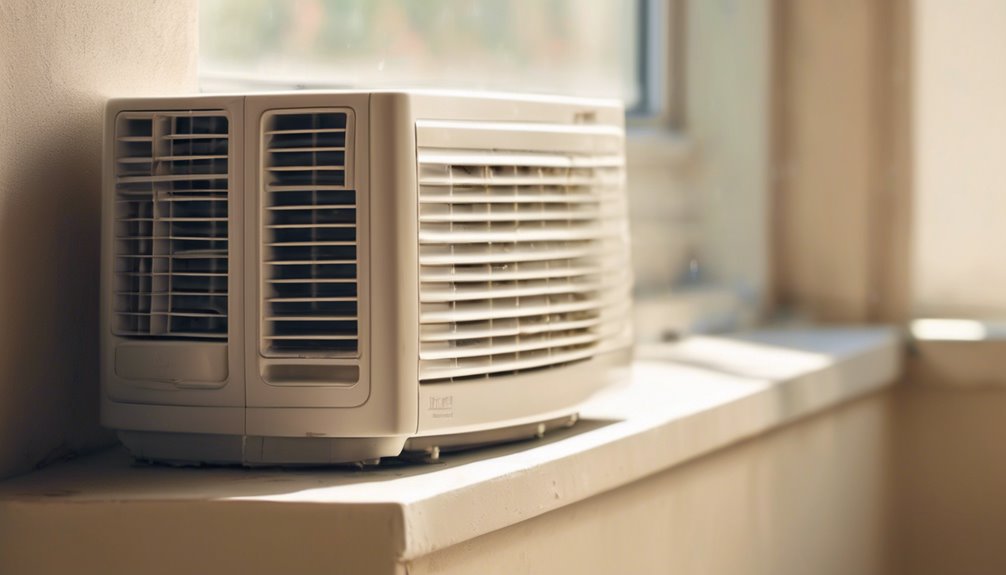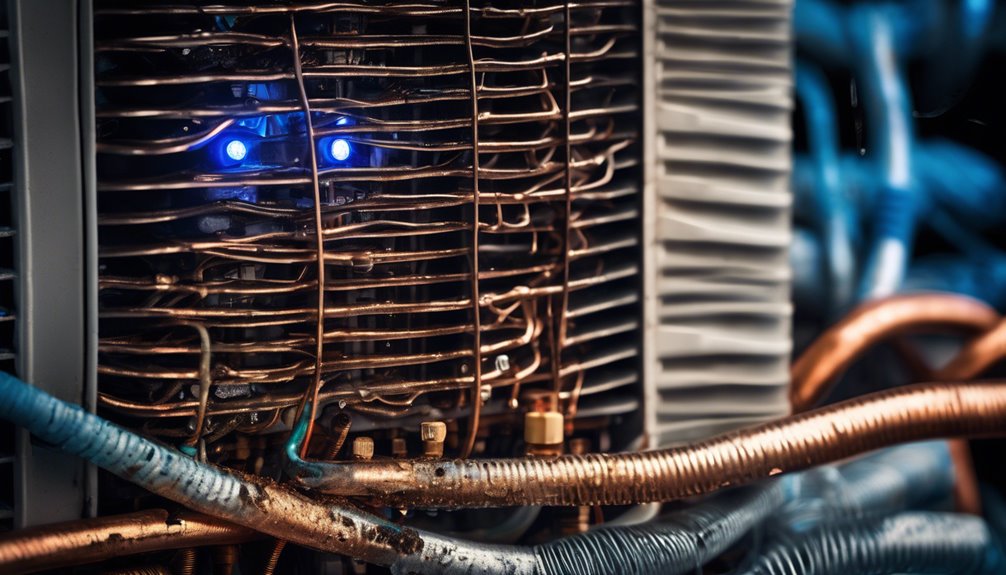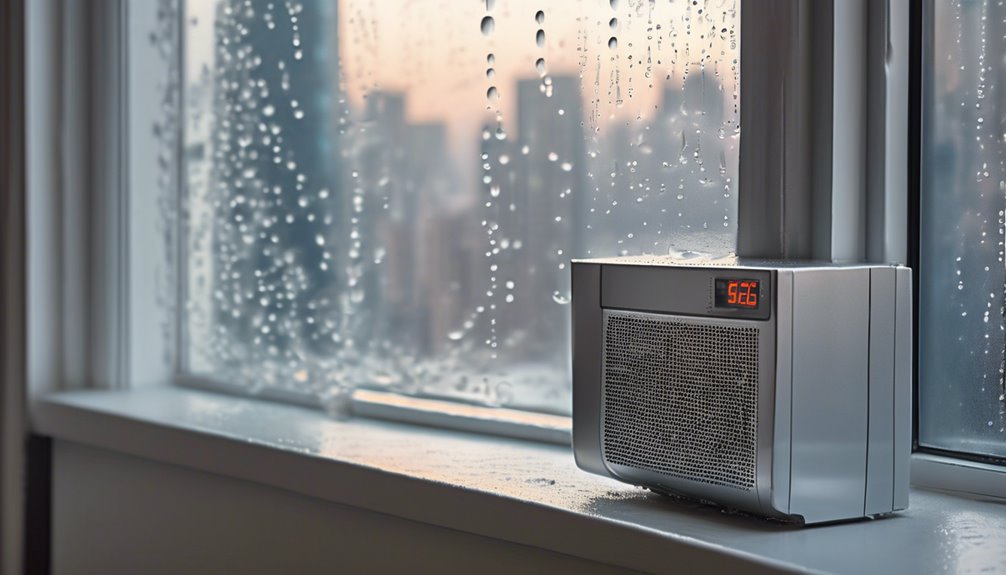If your AC isn't cooling properly, it's likely due to a common issue that can be easily fixed. You might have a dirty or clogged air filter, restricting airflow and making your AC work harder. Alternatively, refrigerant leaks, frozen coils, thermostat malfunctions, or electrical problems could be to blame. To get your AC running smoothly again, you'll want to identify the root cause and take action. By exploring these potential culprits, you'll be well on your way to enjoying a cool and comfortable living space once more.
Key Takeaways
- A dirty or clogged air filter can restrict airflow, reducing your AC's performance and causing it to work harder.
- Refrigerant leaks or insufficient refrigerant can significantly reduce your AC's cooling performance, leading to increased energy bills.
- Frozen coils and ice buildup can prevent your AC from cooling properly, often caused by dirty or clogged coils.
- A faulty thermostat can misread room temperature, preventing your AC from cooling effectively, and may require sensor calibration or replacement.
- Electrical problems, including capacitor failure, can reduce your AC's cooling performance, and must be addressed promptly to avoid further damage.
Dirty or Clogged Air Filters
One of the most common culprits behind an AC's inability to cool properly is a dirty or clogged air filter.
You mightn't realize it, but a dirty air filter can significantly reduce your AC's performance. When your filter is clogged, it restricts airflow, making it harder for your AC to circulate cool air throughout your home.
A dirty air filter can significantly reduce your AC's performance, restricting airflow and making it harder to circulate cool air.
This leads to increased energy bills and a hotter living space. To avoid this, you need to prioritize filter maintenance.
Check and clean your air filter every month, or replace it every 2-3 months, depending on usage. By doing so, you'll ensure proper airflow and keep your AC running efficiently.
Refrigerant Leaks and Insufficient Refrigerant
How can you be certain your AC is operating at its best when you haven't checked the refrigerant levels lately?
Low refrigerant levels can significantly reduce your AC's cooling performance. Refrigerant leaks are a common issue, and they can lead to insufficient refrigerant, causing your AC to work harder and consume more energy.
You can use refrigerant detection methods, such as leak-down tests or dye injection, to identify leaks. If you find a leak, have it repaired and then perform a system recharging to ensure your AC has the right amount of refrigerant.
This will help your AC cool your space efficiently and effectively. Don't let refrigerant leaks and insufficient refrigerant hold you back from enjoying a cool and comfortable home.
Frozen Coils and Ice Buildup
What could be causing your AC to blow warm air when the coils are frozen solid?
Frozen coils and ice buildup are common issues that prevent your AC from cooling properly. When your AC's coils are dirty or clogged, it can't dissipate heat efficiently, leading to ice accumulation.
As a result, your AC blows warm air instead of cold. Check your AC's air filter and clean or replace it if necessary. Also, ensure that there's sufficient airflow around the outdoor unit.
If the problem persists, your AC may need to go into a defrost cycle to melt the ice. If you're not sure how to do this, it's best to consult a professional to avoid damaging your AC.
Thermostat Issues and Malfunctions
Your thermostat is the brain of your AC system, so when it malfunctions, your entire cooling process can be thrown off.
A faulty thermostat can prevent your AC from cooling properly, leaving you hot and frustrated.
A malfunctioning thermostat can render your AC useless, leaving you sweltering and irritable.
Here are some common thermostat issues to check:
- Sensor calibration: If the thermostat's temperature sensor is miscalibrated, it may not accurately read the room temperature, causing your AC to malfunction.
- Faulty installation: If your thermostat was installed incorrectly, it may not function properly, leading to cooling issues.
- Dead batteries: If you have a wireless thermostat, dead batteries can prevent it from sending signals to your AC, causing it to malfunction.
Check these potential issues to ensure your thermostat is working correctly and your AC is cooling properly.
Electrical Problems and Capacitor Failure
When electrical problems arise, your AC's cooling performance can suffer significantly.
One common issue is faulty wiring, which can cause voltage drops that reduce your AC's ability to cool effectively. A circuit overload can also lead to electrical problems, as it can trip the circuit breaker and shut down your AC entirely.
Moreover, a faulty capacitor can prevent your AC's compressor and fan motor from working properly, further reducing cooling performance.
If you suspect electrical problems, it's essential to have them addressed promptly to avoid further damage to your AC. A licensed electrician can diagnose and repair electrical issues, including capacitor failure, to get your AC running smoothly again.
Frequently Asked Questions
Can I Use a Dehumidifier to Supplement My Ac's Cooling?
You can use a dehumidifier to supplement your AC's cooling by removing excess moisture, creating dry air that's easier to cool. This provides supplemental cooling, taking some load off your AC and making your space feel cooler.
Will a Programmable Thermostat Save Me Money on Energy Bills?
You'll likely save money on energy bills with a programmable thermostat, thanks to its energy efficiency and smart features that learn your schedule to optimize cooling and heating when you need it most.
How Often Should I Clean My Ac's Exterior Unit?
You should clean your AC's exterior unit every 1-3 months to ensure optimal performance. Remove leaves, branches, and other outdoor obstacles, and gently hose down dusty coils to improve airflow and keep your unit running efficiently.
Can I Install an AC Unit Myself to Save Money?
You're considering installing an AC unit yourself to save money, but beware: DIY risks and installation errors can lead to safety hazards, reduced efficiency, and even void your warranty, costing you more in the long run.
Do AC Maintenance Plans Really Offer Significant Benefits?
You're wondering if AC maintenance plans are worth it – and they are! By investing in regular tune-ups, you'll enjoy cost savings on repairs and replacements, plus an extended lifespan for your unit, keeping you cool and comfortable for years to come.
Conclusion
You've checked all the likely culprits, and now you know why your AC isn't cooling properly. Dirty or clogged air filters, refrigerant leaks, frozen coils, thermostat issues, and electrical problems are all common causes. By addressing these potential issues, you can get your AC running smoothly again. Remember to regularly maintain your unit to prevent these problems from happening in the first place. With a little troubleshooting and TLC, you'll be back to cool comfort in no time.



